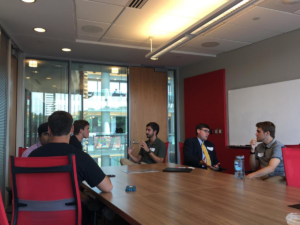A Culture of Conversation
go.ncsu.edu/readext?621732
en Español / em Português
El inglés es el idioma de control de esta página. En la medida en que haya algún conflicto entre la traducción al inglés y la traducción, el inglés prevalece.
Al hacer clic en el enlace de traducción se activa un servicio de traducción gratuito para convertir la página al español. Al igual que con cualquier traducción por Internet, la conversión no es sensible al contexto y puede que no traduzca el texto en su significado original. NC State Extension no garantiza la exactitud del texto traducido. Por favor, tenga en cuenta que algunas aplicaciones y/o servicios pueden no funcionar como se espera cuando se traducen.
Português
Inglês é o idioma de controle desta página. Na medida que haja algum conflito entre o texto original em Inglês e a tradução, o Inglês prevalece.
Ao clicar no link de tradução, um serviço gratuito de tradução será ativado para converter a página para o Português. Como em qualquer tradução pela internet, a conversão não é sensivel ao contexto e pode não ocorrer a tradução para o significado orginal. O serviço de Extensão da Carolina do Norte (NC State Extension) não garante a exatidão do texto traduzido. Por favor, observe que algumas funções ou serviços podem não funcionar como esperado após a tradução.
English
English is the controlling language of this page. To the extent there is any conflict between the English text and the translation, English controls.
Clicking on the translation link activates a free translation service to convert the page to Spanish. As with any Internet translation, the conversion is not context-sensitive and may not translate the text to its original meaning. NC State Extension does not guarantee the accuracy of the translated text. Please note that some applications and/or services may not function as expected when translated.
Collapse ▲We believe in the power of conversation and stories. They have the power to shift perspectives and help us see issues from another person point of view. This post comes from Cyrus Rad who has worked extensively to bring people together for the purpose of productive, respectful, conversation.

A Culture of Conversation
By Cyrus Rad
When was the last time you had an uncomfortable conversation? Not an awkward exchange with a new classmate, or small talk with the guy behind you in the grocery store. I mean a thoughtful conversation about something that affects you, our society, or our world? A conversation that made you rethink or refine your own perspective?
In an increasingly polarized political atmosphere, we’ve become accustomed to saving our breath. We have our beliefs, the other side has theirs, and we’re always going to disagree. There’s no point in kindling further conflict when topics like immigration, abortion, and health care can blow up in an instant.
This summer, I worked with the Institute for Emerging Issues (IEI) at NC State University to help shift this attitude. Their new initiative, Civic Conversations, promotes conversations across difference, and my role was to promote this concept on campus. The hope is that these conversations, when held openly and respectfully, can help humanize different perspectives and establish common ground on difficult topics.
This work was unlike anything I’d done before – during the year I’m usually studying and playing soccer. But in meeting with student groups and staff on campus, I found that there are a lot of people who agree with the goal of Civic Conversations, but who don’t feel that there is currently a space for such dialogue. My goal was to push them into action.
One event we held on campus this summer was a communication workshop. We invited three conservative and three progressive participants to talk about immigration. They  were able to identify overlapping interests, dissect differences of opinion, and walk away with a better understanding of the opposing side. They agreed that our nation needs a more efficient path to citizenship and that immigrants positively contribute to our economy. Finding such common ground can be the first step towards productive and collaborative work across difference.
were able to identify overlapping interests, dissect differences of opinion, and walk away with a better understanding of the opposing side. They agreed that our nation needs a more efficient path to citizenship and that immigrants positively contribute to our economy. Finding such common ground can be the first step towards productive and collaborative work across difference.
With this spirit, we have the power to create a culture of conversation, a climate where difference is welcomed and valued rather than avoided. Through Civic Conversations, we are working to establish this environment, but it relies on a snowball effect. Individuals have to be willing to embrace difference and discomfort, and breathe life into conversations in their own communities.
Want to know how to get your conversation started?
Visit IEI’s website or reach out to Program Manager Maggie Woods.
Discussion Questions:
Why is it important to have uncomfortable conversations?A Culture of Conversation
What is a strategy for keeping a conversation that might turned heat respectful?
What “civic conversation” would you like to have?


